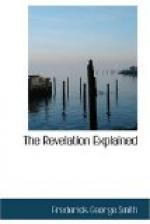One more point of importance must be considered before we conclude this chapter, and that is the continuance of the Ottoman power. The first, or Saracen, woe had power to torment men “five months,” or one hundred and fifty years, during which time they continued their ravages. The second woe began when the command was given to loose the four angels, or the beginning of the Ottoman conquests. “An hour, and a day, and a month, and a year,” or three hundred and ninety-one years, marked the time during which they were “prepared” to extend their conquests. But it is not stated that the woe itself, or the Ottoman power, would then cease; for it is not represented as ending until after the death and the resurrection of the witnesses (chap. 11:14), immediately following which the coming of Christ and the general judgment, or the third woe, is described. Verses 15-18. The Turkish power has made no advance for centuries, but has been on the decline; yet it will endure for its allotted time. It furnishes us a way-mark by which we can determine our position along the pathway of time; for when it falls, we may rest assured that the coming of Christ is imminent.
For nearly two centuries it has been the wonder of civilized nations how that corrupt, tyrannical government, which has been described as a “despotism tempered by assassination,” could exist in the increased light and onward advance of modern civilization. Concerning its position in Europe, Judson, in his recent history of Europe in the Nineteenth Century, says: “The Turkish empire has been an element of unrest in Europe. It has long been plain to all that it is not permanent. It has taken no root. The Turks are merely encamped in Europe; and it is merely a question of time when the last of them must return across the Bosphorus.” Pp. 269, 270. But Turkey will continue to hold this territory of the old Greek empire until the time appointed by the Father for her overthrow. The nations of Europe have often conspired for her overthrow. This is what is known as the great Eastern Question, which has been described by one writer as “the expulsion of the Turk from Europe, and the scramble for his territory.” But it has not yet been accomplished, for the very reason doubtless, that it could not take place before the resurrection of the witnesses, of which we will speak later. Judson thus continues his account of the matter: “As soon as this idea was realized [that Turkish power in Europe must fall] by the Western nations, in place of the dread of the Turk which had so long been part and parcel of European thinking, the question of the disposal to be made of the Turkish possessions became matter of live interest. And this is the Eastern Question. The Greek empire vanished forever when the last Constantine fell in 1453. The only problem is one of partition. And the heart of it all is the disposal to be made of Constantinople. That imperial city is a site that, in strong hands,




